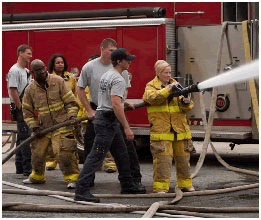Citizens academies are educational programs conducted by cities and counties aiming to create better informed and engaged citizens. These programs involve ordinary citizens participating in several (usually between six and twelve) sessions taught by local government officials on the wide range of local government services and operations. Programs are usually taught to cohorts of 20-25 residents and end with a graduation. Participants not only learn about their local government, but also learn about how they can be directly involved in it by, for example, serving on citizen advisory boards or committees.
There are dozens of local governments running citizens academies here in North Carolina. Some long-standing, well-regarded programs include (in no particular order): Cary’s “School of Government,” Durham City/County’s “Neighborhood College,” Greensboro’s “City Academy,” and Concord’s “Concord 101.” There are many other excellent programs in North Carolina, even in smaller communities such as Garner and Aberdeen.
Over the last several years I have studied these programs in some depth. I’ve learned that they are a relatively new phenomenon, with the vast majority of programs beginning within the last decade. They seem to be modeled after more longstanding citizen police academies as well as, to some extent, community leadership programs often organized by local chambers of commerce or other nonprofit groups. What makes these programs unique, however, is that they are run by local governments and educate citizens on the full range of local government operations and services. Programs typically include a lot of hands-on learning, including field trips to water plants, fire stations, recreation centers, and so on.
 The reasons why local governments invest time and money into citizens academies are pretty straightforward. First, they are a good public relations tool. Graduates of citizens academies are often very impressed by what they have learned and by the people they get to know, and because of this often become informal ambassadors for the local government out in the community. Academy graduates also tend become more involved and are more knowledgeable participants. As local governments seek to better engage citizens in community affairs, there is more of a recognition of the need to develop a deeper pool of citizens that are both engaged and informed. Thus many programs explicitly link their citizens academies with filling positions on various boards and commissions.
The reasons why local governments invest time and money into citizens academies are pretty straightforward. First, they are a good public relations tool. Graduates of citizens academies are often very impressed by what they have learned and by the people they get to know, and because of this often become informal ambassadors for the local government out in the community. Academy graduates also tend become more involved and are more knowledgeable participants. As local governments seek to better engage citizens in community affairs, there is more of a recognition of the need to develop a deeper pool of citizens that are both engaged and informed. Thus many programs explicitly link their citizens academies with filling positions on various boards and commissions.
But the value of citizens academies, goes beyond creating more knowledgeable citizens. A survey I conducted in 2011 demonstrated a significant increase in civic involvement of participants after attending citizens academies. The programs also develop social capital to the extent that relationships of trust are developed between government staff and citizens as well as among participants themselves. And deepening the pool of engaged and informed citizens also adds what you might call political or civic capital to the community. In fact you will find many citizens academy graduates serving in elected office.
Clearly the extent to which a particular program develops social and civic capital will depend upon the extent to which the program seeks to go beyond merely informing participants. There is a big difference between a two-hour PowerPoint lecture on the city budget and an engaging budget simulation exercise, for example. But the potential is clearly there for citizens academies to make significant contributions to developing local civic capacity or what some call “civic infrastructure.” Civic infrastructure is about a community’s ability to act as a community, where there is concerted effort of all sectors of the community on issues that matter to the community as a whole. Citizens academies are one small, but significant (and often overlooked), way that local governments can contribute to the development of that kind of civic infrastructure. It seems like an investment worth making.
This post is adapted from a blog post Rick authored on the CED Blog.
Did you publish the results of your survey? I would be interested in knowing more about the selection process for choosing who participates in these academies and how the local governments insure diverse representation of the community. I know the one in Winston-Salem involves an application process but have never been clear on selection criteria.